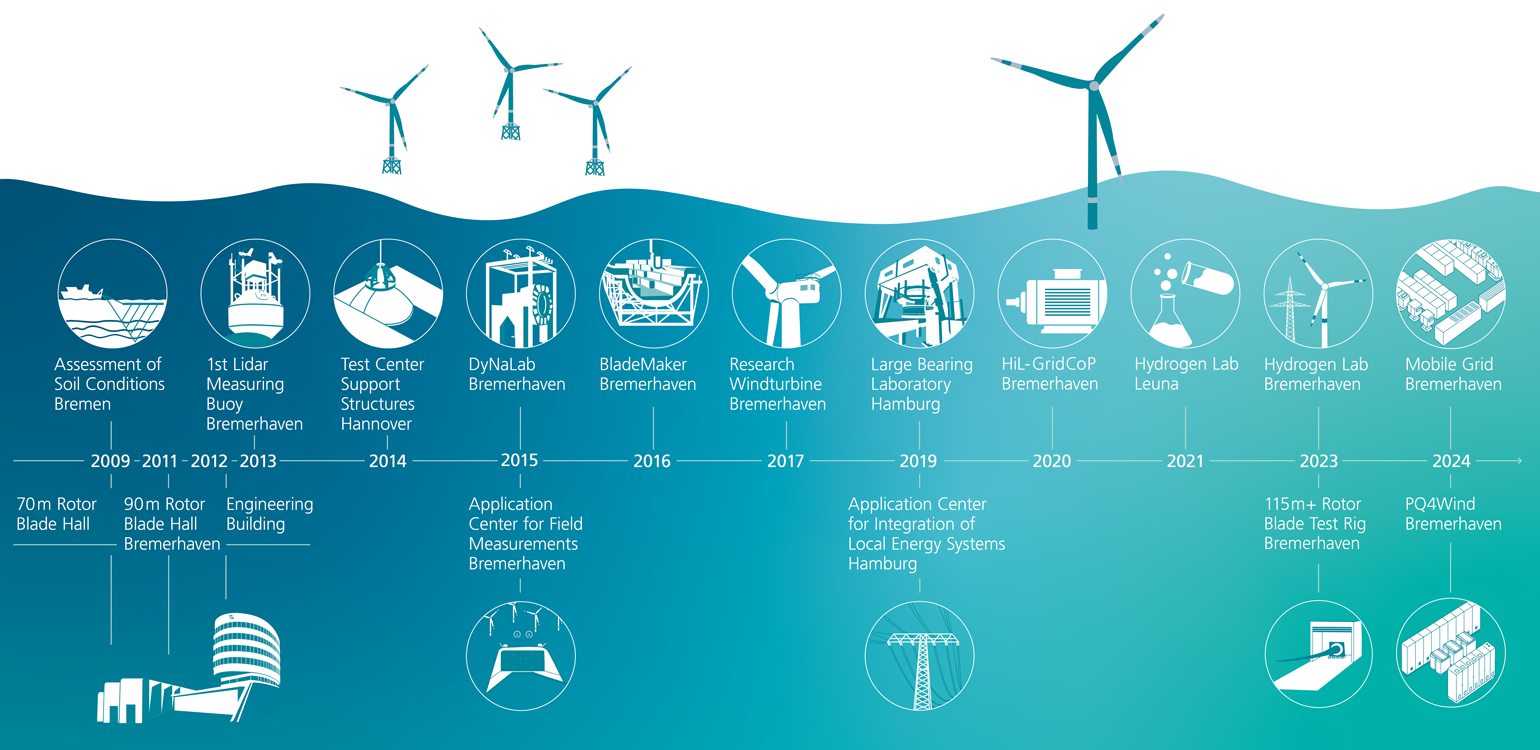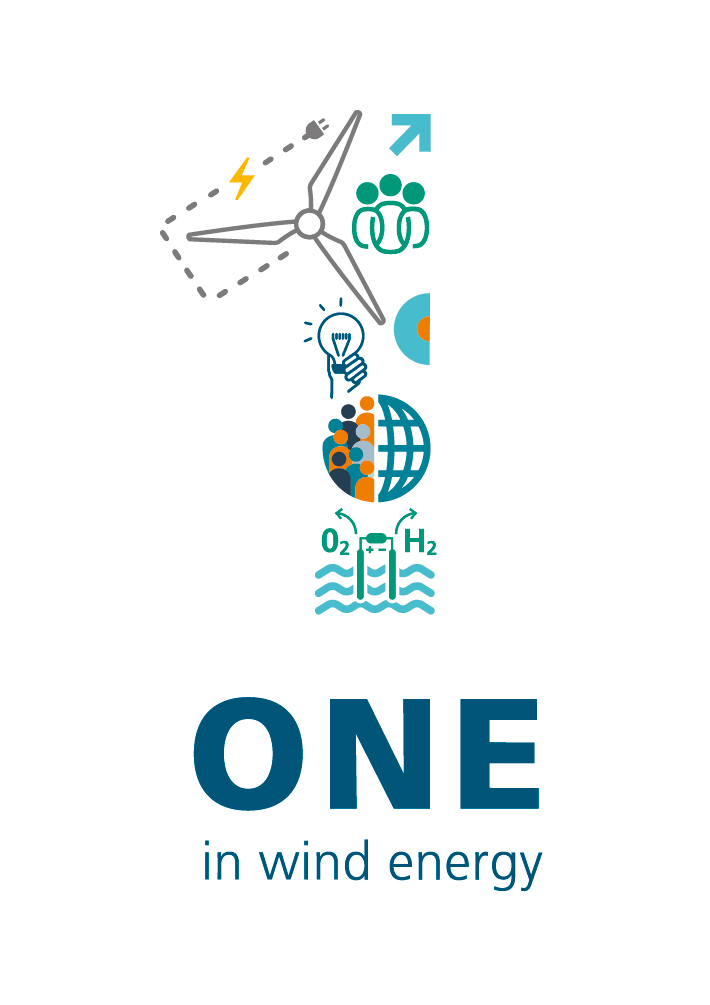
IWES – Institute for applied research

- Testing, measuring, validating – future technologies with IWES
- Sustainability: Science and teaching for a clean environment
- Vision: Excellence and expertise for the economy and society
- Wind energy: Most important source of energy for climate protection
- Hydrogen: Added value in the value chain thanks to pilot systems
- Symbiosis: Wind energy and hydrogen for a decarbonized economy
Testing, measuring, validating – future technologies with IWES
Fraunhofer IWES was founded in 2009 and has grown continuously ever since. By merging the Fraunhofer IMWS competence field with the hydrogen activities of Fraunhofer IWES, we operate sites in Leuna and Görlitz as well as Bremerhaven with different focuses on the hydrogen value chain.
The core of the IWES brand is the testing, measuring, and validation of components spanning all areas of wind energy and hydrogen technologies as well as the qualification of sites for the future harvesting of wind energy. We secure the investments of our clients in technological advancements with our work, research, and innovative methods.
We shorten innovation cycles, accelerate certification procedures, and increase planning accuracy. In the scope of our Strategy 2025, we are expanding our focus with research activities on the topics of digitalization, sector coupling, and project planning optimization as well as the operation of wind turbines and farms.
IWES is currently home to more than 400 employees in science and administration at nine sites.

Sustainability: Science and teaching for a clean environment
Sustainability is at the heart of IWES’ research for future-oriented developments, materials, and products. Within our institute, we have defined corresponding focuses and measures that we continuously evaluate and develop further. We also raise our employees’ awareness for sustainable actions at all times.
Suitable measures help to reduce the institute’s own carbon footprint. We handle our resources and, in particular, hazardous substances extremely responsibly. With our work, we exert great influence on sustainable operations. For example, we are able to reduce water consumption and pollution while minimizing the negative impact of our technologies. Our aim is to generate and utilize wind energy and hydrogen in the most environmentally friendly manner possible.
Vision: Excellence and expertise for the economy and society
As part of the Fraunhofer-Gesellschaft, IWES conducts applied research for the benefit of economy and society. As an industry institute with a focus on wind energy and hydrogen technologies, close collaboration with industrial partners is essential for our existence. Their direct orders are a supporting pillar of the institute’s financing and a prerequisite for success and growth. Our research activities are consistently geared towards the industry’s requirements and their timing, while maintaining the utmost confidentiality. Our services and methods can be employed to solve acute and future problems. IWES contributes to innovative capacity around the world with many registered patents. In addition, we are making significant contributions to the energy transition – for a global future worth living.

Wind energy: Most important source of energy for climate protection
The positive development of the wind energy industry is based on highly sophisticated turbine technology resulting from innovative research. The continuous process of rotor blade development is a prime example of this. IWES researches and validates the whole rotor blade spectrum from the description of the wind field to the qualification of the materials and components right up to full-scale testing of rotor blades.
We operate test benches for rotor blades, large bearings, support structures, and nacelles as well as material test laboratories for experimental analysis of new designs and their comparison with computer models. In addition, we take measurements on turbines in operation and record wind, waves, and current with innovative processes. Shaping the future through technological progress – Fraunhofer IWES stands for sustainable development for the benefit of society.
We work closely with the industry to develop specific solutions for, for example:
- the accelerated time to market of new turbine designs;
- the installation of quiet offshore turbines;
- the reduction of wake-induced power losses in wind farms;
- the improvement of the production quality of rotor blades;
- the exact calculation of the wind potential of individual sites.
Hydrogen: Added value in the value chain thanks to pilot systems
Green hydrogen is a key element for supplying the industry with sustainable raw materials and achieving climate goals. By merging the Fraunhofer IMWS competence field with the hydrogen activities of Fraunhofer IWES and the setting up and operation of the three Hydrogen Labs in Bremerhaven, Leuna, and Görlitz, IWES now offers a digitally networked infrastructure for the very first time. Optimally controlling their test capacities and utilization, we can make clients offers with optimized time availability from a single source.
We have test and qualification capacities of up to 26 megawatts (MW) for the electrolysis and fuel cell systems required for this. This supports the necessary market ramp-up of H2 technologies, which we are still accelerating by pooling our hydrogen activities in northern and eastern Germany.
The hydrogen value-creation process of our digitally networked Hydrogen Labs:
- CO2-neutral electricity generation through offshore and onshore harvesting of energy;
- Optimization of the electrolysis and the production of the systems employed;
- Use – for example, in the chemical industry – as well as storage and transport of green hydrogen.
Symbiosis: Wind energy and hydrogen for a decarbonized economy
The transition to a decentralized energy system with volatile renewable energy production demands special solutions for stable and reliable grid operation. This future energy system will be shaped by renewable energy sources and hydrogen technologies in particular. For Fraunhofer IWES, the focus is on the utilization of electricity from wind turbines to produce hydrogen.
Wind energy and hydrogen production complement each other: hydrogen as an energy carrier makes (wind) energy storable and transportable. As a result, no energy is lost due to curtailment when wind levels are high. In the steel and chemical industries in particular, but also in other industries, green hydrogen and its synthesis products can contribute significantly to decarbonization.
Bundling our wind energy and hydrogen activities allows us to work on cross-sector solutions for the energy system of the near future. From wind-based power generation to hydrogen production and grid integration, we cover the interaction of large regional power generation, storage, and consumption units competently.
We will be happy to assist you with any questions you have concerning the planning, realization, and optimization of wind turbines or hydrogen production. Please feel free to get in touch!